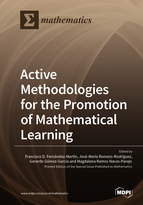Active Methodologies for the Promotion of Mathematical Learning
A special issue of Mathematics (ISSN 2227-7390). This special issue belongs to the section "Engineering Mathematics".
Deadline for manuscript submissions: closed (31 March 2021) | Viewed by 132682
Special Issue Editors
Interests: program evaluation; plurilingual education; peer learning; entrepreneurship education; bullying behavior; service learning; civic engagement; inclusive education; counseling; elderly education; special educational needs
Special Issues, Collections and Topics in MDPI journals
Interests: educational technology; teacher training; higher education; sustainability education; social networks; educational innovation; active methodologies; Internet risks; mobile learning.
Special Issues, Collections and Topics in MDPI journals
Interests: E-Learning; Innovation; ICT; Digital Literacy; Flip Teaching; Fake News; Informational Literacy
Interests: active methodologies; information and communication technologies (ICT) in education; reading promotion for educational inclusion
Special Issues, Collections and Topics in MDPI journals
Special Issue Information
Dear Colleagues,
In recent years, the way of teaching has been in a process of transition. Multiple active methodologies have proliferated, with the aim of changing the concept we have had of teaching so far. These advocate for a student who plays a leading role in the process of building learning, while a teacher acts as that figure who facilitates and glimpses the paths to learning. To be able to carry out this type of teaching in an optimal way, it is necessary for the teaching and research community to be correctly trained in its pedagogical principles and in the tools that boost its implementation. Among them, it is of vital importance that information and communication technologies (ICT) be adequately handled. The use of active methodologies (project-based learning, problem-based learning, service learning, flipped classroom, mobile learning, etc.) or innovative pedagogical approaches (simulation, role-playing, gamification, etc.) promotes an improvement in the motivation of students as well as their skills. This aspect is especially important in the area of mathematics, whose contents are characterized by their abstraction and, therefore, highlights the need for its dynamization in classrooms of different educational stages.
Based on these ideas, the present issue of the journal Mathematics entitled “Active Methodologies for the Promotion of Mathematical Learning” aims to bring together studies and research as well as theoretical contributions that exemplify and support good educational practices in which active methodologies have been used in the mathematics classroom. Scientific contributions will be accepted under the following mathematics: active methodologies (project-based learning, problem-based learning, flipped classroom, gamification, mobile learning); active learning approaches (simulation and role-playing, learning through video games, active use of social networks to improve mathematical content, educational video etc.); application of emerging technological resources in the mathematics classroom (augmented reality, virtual reality, robotics, etc.); works from a systematic or theoretical approach.
Overseeing this Special Issue are the Guest Editors Francisco D. Fernández-Martín PhD from the Department of Developmental and Educational Psychology of the University of Granada, José-María Romero-Rodríguez (Head of Centre) MEd from the Association for Research and Promotion of Education in the Digital Society—PROMOEDUCA, Gerardo Gómez-García MEd from Department of Didactics and School Organization of the University of Granada and Magdalena Ramos Navas-Parejo, MEd from Department of Didactics and School Organization of the University of Granada. All with extensive publishing experience and multiple publications of high impact linked to teaching innovation and improvement of its quality. We look forward to seeing this Special Issue come to fruition, together with your contributions and perspectives on this topic.
Prof. Dr. Francisco D. Fernández-Martín
Dr. José-María Romero-Rodríguez
Dr. Gerardo Gómez-García
Dr. Magdalena Ramos Navas-Parejo
Guest Editors
Manuscript Submission Information
Manuscripts should be submitted online at www.mdpi.com by registering and logging in to this website. Once you are registered, click here to go to the submission form. Manuscripts can be submitted until the deadline. All submissions that pass pre-check are peer-reviewed. Accepted papers will be published continuously in the journal (as soon as accepted) and will be listed together on the special issue website. Research articles, review articles as well as short communications are invited. For planned papers, a title and short abstract (about 100 words) can be sent to the Editorial Office for announcement on this website.
Submitted manuscripts should not have been published previously, nor be under consideration for publication elsewhere (except conference proceedings papers). All manuscripts are thoroughly refereed through a single-blind peer-review process. A guide for authors and other relevant information for submission of manuscripts is available on the Instructions for Authors page. Mathematics is an international peer-reviewed open access semimonthly journal published by MDPI.
Please visit the Instructions for Authors page before submitting a manuscript. The Article Processing Charge (APC) for publication in this open access journal is 2600 CHF (Swiss Francs). Submitted papers should be well formatted and use good English. Authors may use MDPI's English editing service prior to publication or during author revisions.
Keywords
- mathematical education
- active methodologies
- educational innovation
- flipped classroom
- mobile learning
- gamification
- information and communication technologies
- emerging technologies
- good practices in mathematics education







